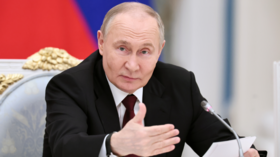Against all votes: NATO greets North Macedonia as 30th member despite failed accession referendum
The Balkan country of North Macedonia is set to officially become the 30th member of NATO on the back of a decades-long spat with Greece, a failed popular vote, and allegations that the US manipulated local politicians.
NATO and North Macedonia signed an accession protocol on Wednesday, meaning that the former Yugoslav republic will officially join the military bloc. Each member will now need to ratify the bid, but it is safe to say that the country’s 10-year accession saga is now over.
North Macedonia is the fourth Balkan country to join NATO following Croatia, Albania and Montenegro. The three states met no resistance while applying for membership, but Skopje did, largely because of the country’s name. Greeks have objected to Macedonia’s name since it ceded from Yugoslavia in 1991, because the country has a region of the same name.
Also on rt.com Macedonia's failed referendum is blow to Western lobbyists, but govt will seek to join NATO anywayOf course, there was no shortage of cheerful comments from NATO officials. “Your accession will bring more stability to the western Balkans. This is good for the region and for Euro-Atlantic security,” NATO Secretary-General Jens Stoltenberg said.
However, experts told RT that they weren’t entirely convinced. “NATO has already absorbed the Baltics and much of eastern Europe,” said Sreeram Chaulia of India’s Jindal School of International Affairs. “They are placing missile-defense shields in Poland and Romania. They have a Cold War mindset and believe that more NATO expansion throughout Europe is necessary to contain Russia,” he suggested.
Pavel Kandel, a research fellow with Russia’s Institute of Europe, suggested Macedonia “is not a win but a loss for NATO militarily” because a country like this would become “a customer, not a contributor of security.” The bloc accepted Macedonia because it wants to control foreign policy in a country where a sizeable part of the population is sympathetic to Russia, he said.
Also on rt.com Greek MPs back Macedonia name-change deal in narrow vote amid repeated protestsLast summer, Skopje and Athens signed the Prespa agreement, under which the country’s name was changed to the Republic of North Macedonia, or North Macedonia for short. Greek lawmakers approved the deal despite widespread opposition from the public.
Back in Macedonia, pushing the name change through stirred a lot more controversy. Last October, some 90 percent said ‘Yes’ in the referendum, which had asked: “Are you for EU and NATO membership by accepting the agreement between the Republic of Macedonia and the Republic of Greece?” However, with an insufficient turnout of around 36 percent, the results were invalidated.
Somehow, Macedonia’s government – led by pro-Western Prime Minister Zoran Zaev – put the issue to a parliamentary vote, which took place despite the failed referendum. During this process, it emerged that the US was trying to force opposition MPs to vote in favor of joining NATO “to advance our shared strategic interests and secure a brighter future for your citizens among the European family of nations.”
Some opposition MPs decided to boycott the controversial vote, standing at the side of the room instead of taking their seats, and the ruling coalition barely secured the required 80 out of 120 votes to push the measure through. Commenting on the vote, the Russian Foreign Ministry maintained that it was rigged, claiming that eight votes had been secured “through blackmail, and threatening and bribing opposition deputies.”
Before the vote, some opposition MPs facing terrorism charges were reportedly offered amnesty if they voted with the ruling party to green-light the name-change process. This prompted accusations that the Western-backed Zaev was simply buying support.
Think your friends would be interested? Share this story!













